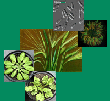| Fitch, MMM; Lehrer, AT; Komor, E; Moore, PH: Elimination of sugarcane yellow leaf virus from infected sugarcane plants by meristem tip culture visualized by tissue blot immunoassay, Plant Pathology, 50, 676-680 (2001) | |
| Abstract: Sugarcane yellow, leaf virus (SCYLV), a member of the Luteoviridae, is implicated in the sugarcane disease known as yellow leaf syndrome (YLS), which is characterized by yellowing of the leaf midrib followed by leaf necrosis and possible growth suppression. YLS is distributed worldwide and susceptible cultivars are commonly infected with SCYLV. However, not all cultivars infected with SCYLV show symptoms of YLS and some cultivars that show symptoms do so sporadically. Since it is difficult to obtain virus-free plants of susceptible cultivars, it has not been possible to study the factors involved in SCYLV infection nor the effects of infection on plant growth and yield. A tissue blot immunoassay was used to visualize in vivo presence of the virus so that virus-infected and virus-free plants could be distinguished. Meristem tip cultures were used to produce virus-free plantings of six SCYLV-susceptible sugarcane cultivars. Nearly all of the regenerated sugarcane lines remained virus-free over a period of up to 4 years, whether grown in isolated fields or in the glasshouse. Experimental re-infection of the virus-free plants by viruliferous aphids demonstrated that meristem tip culture did not affect susceptibility of sugarcane to SCYLV. Improved diagnosis and production of virus-free plants of SCYLV-susceptible cultivars will facilitate research to quantify the effect of the virus on yield and to analyse the processes involved in disease development. |

